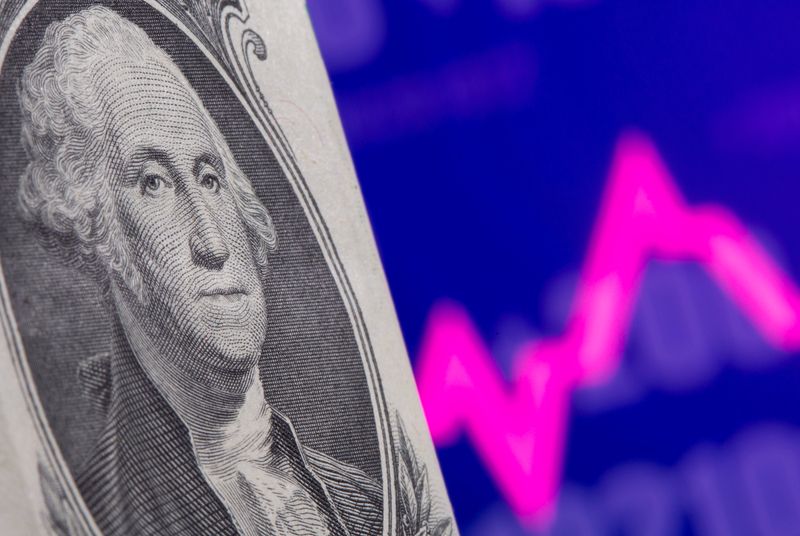 © Reuters. A U.S. one dollar banknote is seen in front of displayed stock graph in this illustration taken May 7, 2021. REUTERS/Dado Ruvic/Illustration
© Reuters. A U.S. one dollar banknote is seen in front of displayed stock graph in this illustration taken May 7, 2021. REUTERS/Dado Ruvic/Illustration
By Herbert Lash and Amanda Cooper
NEW YORK/LONDON (Reuters) -The dollar slumped on Friday after signs of a less resilient U.S. labor market reduced the outlook for how long the Federal Reserves will keep interest rates higher, while the yen surged on concerns the 10-year Treasury's yield rose above 4%.
The U.S. economy added the fewest jobs in 2-1/2 years in June, the Labor Department said in an employment report that also showed 110,000 fewer jobs were created in April and May than earlier reported.
A jump in the number of people working part-time for economic reasons also suggested a weaker labor market, but the pace of job growth remains strong and with inflation still double the Fed's target rate, a rate hike this month is likely.
Marc Chandler, chief market strategist at Bannockburn Global Forex in New York, said markets are looking at next week's release of the Consumer Price Index (CPI), which could show inflation slowing to 3.1%. That would reduce the likelihood of another rate hike by the Fed after one expected in late July.
"This is a inflection point," he said. "The dollar's rally in the second half of June was a counter-trend correction and the dollar’s underlying downtrend that began last September-October will resume."
The yen rose 1.37% to 142.13, a two-week high against the U.S. currency, as the rise in 10-year Treasury's yield above 4% heightened market concerns that Japan might intervene in currency markets, said Joe Manimbo, senior market analyst.
"Risk aversion being a dominant theme this week, coupled with dollar-yen hanging around these elevated levels, has the market nervous that Japan may be edging closer to jumping back in and intervening in support of the yen," he said.
"We're still in striking distance of 145, which appears to be the line in the sand, with Treasury yields - the 10-year in particular keeping above 4% - that's a sign that any moves to the downside in dollar-yen may prove very limited."
The dollar index fell 0.776% at 102.280, while the euro was up 0.72% to $1.0964.
The dollar and other major currencies, with the exception of Japan's yen, are in a tight trading range as most central banks are engaged in tightening monetary policy to fight inflation. Strong U.S. economic data on Thursday pushed short-dated Treasury yields to their highest since 2007, reflecting the view that the Fed is likely to raise rates by 25 basis points when it concludes a two-day policy meeting on July 26.
After the jobs data, futures pointed to an 88.8% probability that the Fed hikes in three weeks.
Earlier, the Japanese labor ministry reported regular wages posted their largest annual increase in May since early 1995, reinforcing the view that the Bank of Japan (BOJ) will have to modify its ultra-loose monetary policy sooner rather than later. "The stronger wage negotiations are starting to feed through, which is what the BOJ wants. They've said very clearly that if they see evidence of more sustained, stronger wage growth that could give them more confidence that they can beat their inflation target and then look obviously to moving away from loose policy settings," MUFG strategist Lee Hardman said.
Adding a tailwind to the rally in the yen was some position-squaring among speculators, who have built up sizeable bearish positions, Hardman said. YEN BEARS, BEWARE Weekly data from the U.S. regulator shows speculators hold a short position in the yen worth $9.793 billion, the largest since May 2022, having almost doubled in size in the last three months alone. The yen has held just below the 145 level - which prompted the BOJ's first intervention in decades last autumn - for about two weeks and authorities have made clear they are concerned about the weakness in the currency. The Australian dollar rose 0.8% to $0.6681, but it is still battered by weak Chinese economic data and broad risk aversion. The offshore yuan fell 0.4% at 7.2257.
Currency bid prices at 3:46 p.m. (1946 GMT)
Description RIC Last U.S. Close Pct Change YTD Pct High Bid Low Bid
Previous Change
Session
Dollar index 102.2800 103.0900 -0.78% -1.169% +103.1900 +102.2200
Euro/Dollar $1.0966 $1.0892 +0.67% +2.34% +$1.0973 +$1.0867
Dollar/Yen 142.1200 144.0600 -1.34% +8.40% +144.1900 +142.0850
Euro/Yen 155.85 156.87 -0.65% +11.08% +156.9300 +155.3900
Dollar/Swiss 0.8889 0.8954 -0.72% -3.86% +0.8969 +0.8879
Sterling/Dollar $1.2833 $1.2740 +0.74% +6.12% +$1.2849 +$1.2727
Dollar/Canadian 1.3277 1.3369 -0.72% -2.04% +1.3386 +1.3266
Aussie/Dollar $0.6688 $0.6626 +0.95% -1.88% +$0.6701 +$0.6620
Euro/Swiss 0.9747 0.9749 -0.02% -1.50% +0.9760 +0.9737
Euro/Sterling 0.8542 0.8547 -0.06% -3.41% +0.8554 +0.8526
NZ Dollar/Dollar $0.6208 $0.6158 +0.87% -2.18% +$0.6219 +$0.6156
Dollar/Norway 10.6160 10.7690 -1.46% +8.13% +10.7750 +10.6110
Euro/Norway 11.6465 11.7212 -0.64% +10.99% +11.7360 +11.6210
Dollar/Sweden 10.8345 10.9232 -0.21% +4.10% +10.9653 +10.8260
Euro/Sweden 11.8812 11.9058 -0.21% +6.56% +11.9508 +11.8655

